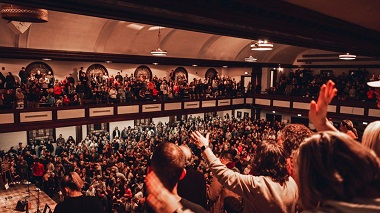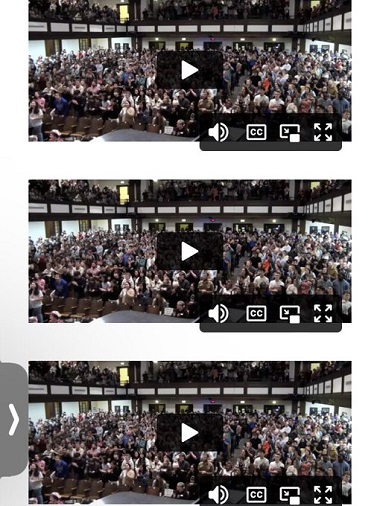If you are like me, your social feeds have been abuzz these past few weeks with news of a revival at Asbury in Kentucky. (Here’s a good summary from Scot McKnight’s substack.)
This is immediately accompanied by the (sadly) usual polarization and argument about whether this is or isn’t a revival based on your own understanding of the term, the way the Holy Spirit works, and your read of history. I grew up in a small-town church that prayed for revivals and my teenage years were spent in Toronto in a Pentecostal school setting while the Toronto Blessing was unfolding. So I’ve been around these kinds of conversations for a long time.
A preamble:
I have two primary sources that I have also turned to for information.
One is Dr. Craig Keener. He presented at our MB Study Conference on Scripture and teaches at Asbury Seminary. His posts on FB have been a helpful first-hand account not only of what is transpiring, but also of the general culture and history of the school and students. One of the challenging things about testing if the Holy Spirit is in something online is that Facebook is not an embodied experience. I know for me I can feel in my body when the Spirit is moving and so I trust Craig’s account of this for him and others.
The second source is my friend Tom Brosius. He’s a local pastor and has been on-site to see for himself. He studied at Asbury Seminary and is also a friend to skeptics and those who feel disenfranchised. He would call bull crap on anything that was not of the Lord because he has a long history of doing so. Both have offered helpful assessments from first-hand experience that have spurred me on to do some thinking on what the Lord might be up to.
With that said, let me offer a few observations and thoughts from a distance. Some of this is general thoughts on what revivals teach us about ourselves and about how we relate to God so even if this isn’t a thing you’ve been tracking, let me know if this makes sense:
Genuine revivals focus on the pouring out of the Spirit; not on the hyping up of emotions.
 The descriptions coming out of Asbury are not those you might expect from a group of mostly young adults gathering for worship in 2023. There are no smoke machines. No skinny jeans. None of the concert-style or stadium style music that attends much of American Christianity. There are spontaneous moments of song but the focus is not on the singer or the stage, it is on the presence of the Lord.
The descriptions coming out of Asbury are not those you might expect from a group of mostly young adults gathering for worship in 2023. There are no smoke machines. No skinny jeans. None of the concert-style or stadium style music that attends much of American Christianity. There are spontaneous moments of song but the focus is not on the singer or the stage, it is on the presence of the Lord.
It is helpful to remind ourselves that in any religious setting, the absence or presence of emotions and emotional outbursts is not a good indicator of the presence of the Spirit. Often the emotive, demonstrative nature of revival-ism convinces us that the Spirit is somehow more present in that we equate a new level of emotion with a new level of Spirit indwelling. But you can fake emotions or gold dust or over-the-top-healings – you can’t fake it or manufacture it when the Spirit genuinely choses to move in grace and power.
For reflection: how much emotion do I expect to be present in a worship gathering? What formed that expectation? (culture, history, temperament). Can I allow others to experience the presence of God differently (meaning with a different level of emotional expression) than me? How does emotion connect to the work of the Holy Spirit in my theology?
Revivals are rooted in repentance.
This is one of the key elements that has both biblical roots as well as historical precedent. When the Spirit of God moves in power, people begin to confess and walk away from sin. Publicly (which is not normal in a culture steeped in individualism and self-protection). As people are invited to draw closer to the presence of God, God highlight areas that require repentance in order to be in God’s holy presence.
This is certainly occurring in Asbury with the altar being a place where people are doing this kind of beautiful confessing and repenting. The inscription above it is beautiful: ‘Holiness Unto the Lord.’
This is also true of the great revivals of history. Life-changing encounters with God often bear long term fruit in their wider culture as whole groups of people choose to walk away from sin and to live in a new level of transformed freedom. This has been happening all over the world in small and big ways for a long time so it is not shocking to see God do this again.
Often in a revival, the lost are drawn to repentance in fresh and powerful ways and we see significant upticks in conversions or rededications. This particular outpouring of the Spirit in Kentucky seems to be currently more a kind of ‘internal’ renewal and repentance at present with healings and other manifestations.
But I don’t think that an absence of mass salvation stories is a good reason to critique it just yet. Let’s wait to see if the students and others who are touched by God begin to step more prophetically into areas of justice with humility. If they begin to love mercy in ways that draw them into life-changing relationships with people in under-resourced neighbourhoods for long term transformation.
The fruit of any revival is change. Changed lives. And changed people change other people. Perhaps the ripple effect is just beginning.
For reflection: If repentance is linked to the Spirit of God moving in power, what in my own life needs to be brought in fresh submission to Jesus? What would it look like for me to increase in holiness instead of increasing in voyeurism into what is going on at Asbury? (Maybe lean more deeply into a Lenten commitment to fasting and prayer.)
So friends, let’s pay attention to our responses to Asbury:
- Repent of a critical spirit – it is so easy to poke holes in something these days. But when I stand before the Lord, I’m pretty sure God is not going to ask me what I thought about what was going on in Kentucky in Feb 2023. God is going to ask me about my sin, however, and so I (and you) had best do some good ol’ fashioned repenting (maybe you need to repent by deleting something critical you posted).
- Resist either jealousy or fatigue – some folks have been praying for decades for a revival experience in their town or college and for whatever reason, the Lord has not moved in power in that way. Do not give up, friend. Keep asking God for a fresh outpouring. Keep standing in unity with others who want to see God’s kingdom come in your city and in your lifetime. Revivals are often preceded by sustained and united prayers across denominational or theological lines. Find a friend who thinks differently than you and seek the Lord together on your knees.
- Move from voyeurism to volunteerism – Instead of reading your twelfth article on this thing, if your church has a prayer meeting, get to it! When was the last time you were on your knees praying for your church and your city? Get off line and get in line for prayer or prayer ministry. If your church has ministry time where people are invited to go for prayer, get there this weekend. Your church might also need extra Spirit-filled people to volunteer in this area or who will make a commitment to pray for their pastor. Be that person.
The point isn’t what God is or is not doing in Kentucky. It is what God wants to do in and through you. So wherever you are, I pray that you will experience God’s presence tangibly in your midst and join me in praying “Come Holy Spirit!”
Related reading on revivals
- Mark Nysewander: Revival Rising: Preparing for the Next Great Wave of Awakening, Seedbed Publishing, 2016
- Michael Gleason: When God Walked on Campus: A Brief History of Evangelical Awakening at American Colleges and Universities, Joshua Press, 2002
- Robert E. Coleman and David J. Gyertson, eds: One Divine Moment: The Account of the Asbury Revival of 1970. 25th Anniversary Edition, First Fruits, 2013




Well balanced, level headed assessment.